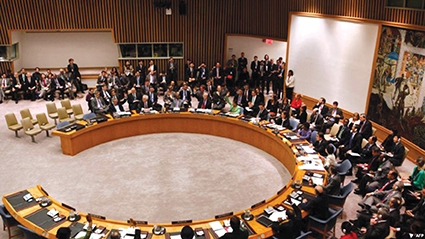UN Security Council Discusses Developments in Georgia’s Occupied Territories
The Security Council of the United Nations (UN) discussed the recent developments in Georgia’s breakaway regions of Abkhazia and South Ossetia at a closed meeting on March 28.
The issue was raised by the Ukrainian Delegation and, as the Ukrainian Ambassador Volodymyr Yelchenko said, the issue will not be suppressed "as long as Ukraine is a member of the Security Council and even after that”.
The top issues discussed at the meeting were: Reduction of crossing-points connecting breakaway Abkhazia with the rest of Georgia, illegal parliamentary elections in Abkhazia, unification of armies under the Russian Armed Forces, as well as the upcoming referendum on changing the name of occupied South Ossetia.
While delivering his speech, Yelchenko stated the situation is deteriorating in the breakaway regions.
“Some people think that this is a frozen or sleeping conflict but the situation reminds us very well of our own painful experience in Crimea. The action by the Russian Federation, which aims at the factual unification of the armed forces of the Russian Federation and Ossetia and Abkhazia; closing down of crossing-points; the ethnic situation in the field of human rights; all, in our opinion, deserve the attention of the Security Council,” he said.
United Kingdom’s Ambassador and Permanent Representative to the UN, Matthew Rycroft, also made a comment, saying the so-called elections in Abkhazia and Tskhinvali region are a “farce”, and the UK does not recognize them.
All the delegations of the UN Security Council were in favor of Georgia’s sovereignty and territorial integrity except the Russian Federation.
Russia’s acting Permanent Representative to the United Nations, Pyotr Ilyichev, said "the situation in Abkhazia and South Ossetia is not a conflict, so the Security Council should not distract its attention to it."
Russian news agency Tass reports that Ilyichev called on other delegations to ‘‘recognize the reality that has formed in the past eight years”.
“The issue of the state sovereignty of Abkhazia and South Ossetia, which were recognized as independent states by Russia, cannot be a subject for discussion," he stressed.
He reminded those present that a special format has been set up to settle problems between Georgia on the one hand and Abkhazia and South Ossetia on the other - the Geneva Discussions on Security and Stability in South Caucasus - and this format has “proven its worth”.
Russia’s representative went on to stress that the initiative to discuss the forthcoming elections and referendum at the Security Council "will only add to the obvious harm done to the Geneva Discussions" by the annual consideration at the General Assembly of a "politicized draft resolution" on refugees in the region.
“If Georgia and its patrons continue to attempt to discuss security problems in New York without Abkhazia’s and South Ossetia’s participation, it may well be the end of the Geneva Discussions," Ilyichev stated.
The Geneva International Talks were established following the Russia-Georgia war of August 2008, which ended with the cutting of diplomatic ties between the two countries. Georgia supported the format which would allow some essential humanitarian measures to be taken in order to protect the rights of Georgians in Abkhazia and Tskhinvali regions, as well as for work to be carried out on an ultimate peaceful resolution of both conflicts.
In addition, the Geneva format has been unprecedented as three moderating parties of the US, the UN, the EU and the OSCE prevent the Russian side from exerting direct diplomatic pressure on Georgia.
Thea Morrison












